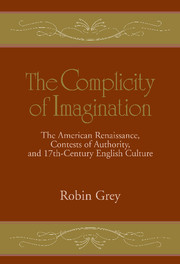 The Complicity of Imagination
The Complicity of Imagination Book contents
- Frontmatter
- Contents
- Acknowledgments
- Cambridge studies in American Literature and Culture
- Introduction: Antebellum America and the Culture of Seventeenth-Century England
- 1 Cultural Predicaments and Authorial Responses
- 2 “A Seraph's Elequence” Emerson's Inspired Language and Milton's Apocalyptic Prose
- 3 Margaret Fuller's “The Two Herberts,” Emerson, and the Disavowal of Sequestered Virtue
- 4 “As if a green bough were laid across the page”: Thoreau's Seventeenth-Century Landscapes and Extravagant Personae
- 5 Melville's Mardi and Moby-Dick, Marvelous Travel Narratives, and Seventeenth-Century Methods of Inquiry
- 6 Surmising the Infidel: Melville Reads Milton
- Notes
- Index
- Cambridge Cultural Social Studies
2 - “A Seraph's Elequence” Emerson's Inspired Language and Milton's Apocalyptic Prose
Published online by Cambridge University Press: 05 November 2009
- Frontmatter
- Contents
- Acknowledgments
- Cambridge studies in American Literature and Culture
- Introduction: Antebellum America and the Culture of Seventeenth-Century England
- 1 Cultural Predicaments and Authorial Responses
- 2 “A Seraph's Elequence” Emerson's Inspired Language and Milton's Apocalyptic Prose
- 3 Margaret Fuller's “The Two Herberts,” Emerson, and the Disavowal of Sequestered Virtue
- 4 “As if a green bough were laid across the page”: Thoreau's Seventeenth-Century Landscapes and Extravagant Personae
- 5 Melville's Mardi and Moby-Dick, Marvelous Travel Narratives, and Seventeenth-Century Methods of Inquiry
- 6 Surmising the Infidel: Melville Reads Milton
- Notes
- Index
- Cambridge Cultural Social Studies
Summary
The Reason of Ch.[urch] Government] & Areopagitica are better poems than whole books of P[aradise] L[ost]
EmersonAfter resigning from his ministerial post and deciding on a literary career, Emerson attempted to calm his anxieties of “going to the bottom” during a winter storm at sea by reciting Milton's elegy about vocation and premature death as a perverse talisman against his own possible death and foreclosed career: “I remembered up nearly the whole of Lycidas, clause by clause, here a verse & there a word, as Isis in the fable the broken body of Osiris.” Milton's elegy, however, did not seem to allay Emerson's fears of dissolution and artistic oblivion, fears perhaps all too vividly associated with the haunting presences of the drowned pastor-poet Lycidas, the dismembered vatic poet Orpheus, and the struggle with vocational ambition in Milton's poem. Yet Emerson's impulse to wrest these “treasures of the memory” from the oblivion of death or forgetfulness suggests that this act of recollection was tied in some powerful way to his desire to survive. In that moment of crisis, Emerson also recalled the enabling apocalyptic vision of Areopagitica, where Milton figures scattered Truth as Osiris gathered up by Isis in order to provide a palpable image of loss recuperated in the millennium. In recollecting this passage, Emerson attempted to effect his own rescue and secure his own artistic as well as physical survival. As in the “Masters second comming,” Emerson himself assumed the power to reunite the fragmented corpus of the Lycidas text, the torn body of the poet Orpheus, and the “broken body” of Truth (Osiris).
- Type
- Chapter
- Information
- The Complicity of ImaginationThe American Renaissance, Contests of Authority, and Seventeenth-Century English Culture, pp. 52 - 86Publisher: Cambridge University PressPrint publication year: 1997


